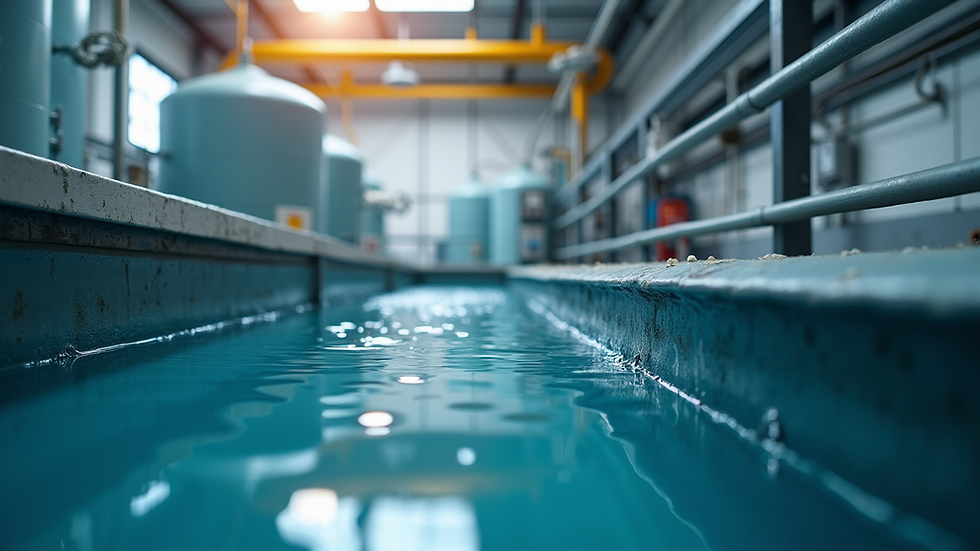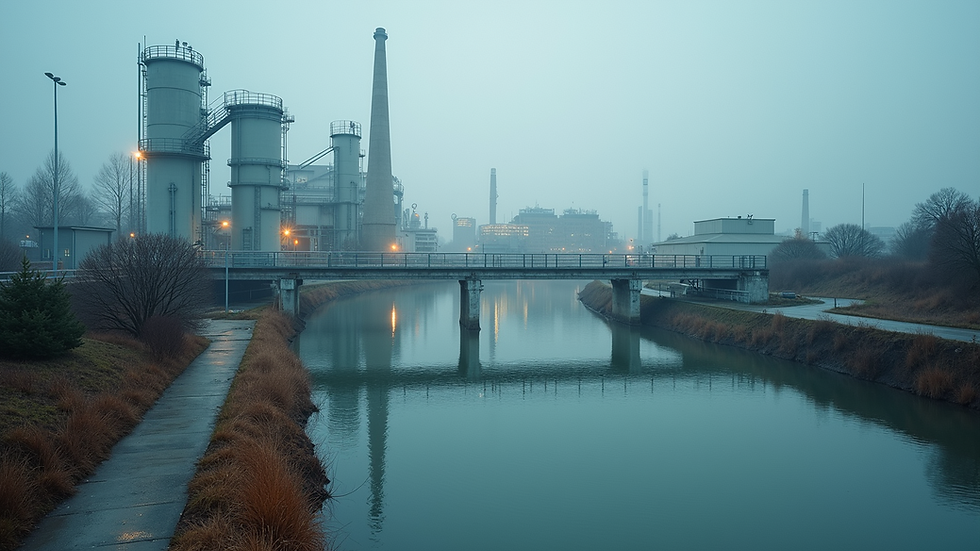Discover the Benefits of Industrial Water Recycling
- palwinder kaur
- Nov 1, 2025
- 4 min read
Water is a vital resource for industries worldwide. As industries grow, so does their demand for water, leading to increased pressure on natural water sources. Industrial water recycling offers a sustainable solution to this challenge. By reusing water within industrial processes, companies can reduce their environmental impact, save costs, and comply with regulations. This article explores the numerous benefits of industrial water recycling and why it is becoming an essential practice in modern industry.
Understanding Industrial Water Recycling
Industrial water recycling refers to the process of treating and reusing water used in industrial operations. Instead of discharging wastewater into the environment, industries treat it to remove contaminants and reuse it for various purposes such as cooling, cleaning, or manufacturing. This approach helps conserve fresh water and reduces the volume of wastewater released.
Industries such as manufacturing, power generation, chemical processing, and food production generate large quantities of wastewater. Recycling this water not only conserves resources but also minimizes the environmental footprint of industrial activities.
Key benefits of industrial water recycling include:
Cost savings: Reducing the need for fresh water lowers water procurement and wastewater treatment costs.
Environmental protection: Less water withdrawal and discharge reduce pollution and preserve ecosystems.
Regulatory compliance: Meeting stringent discharge standards becomes easier with effective water reuse.
Resource efficiency: Optimizing water use enhances overall operational efficiency.

Advantages of Industrial Water Recycling
Implementing industrial water recycling offers multiple advantages that benefit both businesses and the environment. Here are some of the most significant benefits:
1. Reduction in Water Consumption
Industries consume vast amounts of water daily. Recycling water reduces the demand for fresh water, which is especially critical in regions facing water scarcity. For example, a paper manufacturing plant can recycle process water to reduce fresh water intake by up to 50%, significantly lowering its environmental impact.
2. Lower Operational Costs
Water procurement and wastewater treatment are major expenses for industries. By recycling water, companies can cut down on these costs. For instance, a chemical plant that reuses treated water for cooling systems can save thousands of dollars annually on water bills and discharge fees.
3. Minimized Environmental Impact
Discharging untreated or partially treated wastewater can harm aquatic life and pollute water bodies. Recycling water reduces the volume of wastewater released, helping industries comply with environmental regulations and protect local ecosystems.
4. Enhanced Corporate Image
Sustainability is increasingly important to consumers and stakeholders. Companies that adopt water recycling demonstrate environmental responsibility, which can improve their brand reputation and attract eco-conscious customers and investors.
5. Compliance with Regulations
Governments worldwide are imposing stricter regulations on industrial wastewater discharge. Recycling water helps industries meet these standards, avoiding fines and legal issues.
6. Energy Savings
Treating and pumping fresh water requires energy. Recycling water within the plant reduces the need for energy-intensive water treatment and transportation, contributing to overall energy savings.

What is the meaning of industrial wastewater?
Industrial wastewater is the water that has been used in industrial processes and contains pollutants such as chemicals, heavy metals, oils, and organic matter. This wastewater requires treatment before it can be safely discharged or reused. Proper management of industrial wastewater is crucial to prevent environmental contamination and health hazards.
Industries generate different types of wastewater depending on their processes. For example, textile factories produce wastewater with dyes and chemicals, while food processing plants generate organic-rich wastewater. Treating this water involves physical, chemical, and biological methods to remove contaminants.
Recycling treated industrial wastewater not only conserves water but also reduces the burden on municipal sewage systems and natural water bodies. For more detailed information on managing and recycling industrial wastewater, visit this resource.
Practical Steps to Implement Industrial Water Recycling
Adopting industrial water recycling requires careful planning and investment. Here are actionable recommendations for industries considering this approach:
1. Conduct a Water Audit
Analyze water usage patterns and identify sources of wastewater within the facility. Understanding where water is used and how much is discharged helps in designing an effective recycling system.
2. Select Appropriate Treatment Technologies
Choose treatment methods based on the type and quality of wastewater. Common technologies include:
Filtration and sedimentation
Chemical coagulation and flocculation
Biological treatment (activated sludge, biofilters)
Membrane filtration (ultrafiltration, reverse osmosis)
3. Design a Recycling System
Develop a system that integrates treatment units with water reuse points. For example, treated water can be reused for cooling towers, boiler feedwater, or cleaning processes.
4. Monitor Water Quality
Regularly test recycled water to ensure it meets quality standards for its intended use. Implement automated monitoring systems for real-time data.
5. Train Staff
Educate employees on the importance of water recycling and proper operation of treatment systems to maintain efficiency.
6. Evaluate Economic Feasibility
Calculate the return on investment by comparing savings on water procurement and discharge fees against the cost of installing and operating recycling systems.
Future Trends in Industrial Water Recycling
The future of industrial water recycling looks promising with advancements in technology and increasing environmental awareness. Some emerging trends include:
Smart Water Management: Integration of IoT and AI for real-time monitoring and optimization of water use.
Zero Liquid Discharge (ZLD): Systems designed to eliminate wastewater discharge by recovering all water.
Advanced Membrane Technologies: Improved membranes offering higher efficiency and lower energy consumption.
Circular Water Economy: Industries collaborating to share and reuse water resources within industrial parks.
These innovations will make industrial water recycling more accessible, efficient, and cost-effective, encouraging wider adoption.
Embracing Sustainable Industrial Practices
Industrial water recycling is a critical step towards sustainable industrial development. By conserving water, reducing pollution, and cutting costs, industries can achieve operational excellence while protecting the environment. Companies that invest in water recycling technologies position themselves as leaders in sustainability and corporate responsibility.
Adopting water recycling not only benefits the planet but also enhances business resilience in the face of water scarcity and regulatory challenges. It is a win-win strategy that industries should prioritize to secure a sustainable future.

By understanding and implementing industrial water recycling, industries can unlock significant benefits that contribute to environmental stewardship and economic efficiency. The time to act is now, as water resources become increasingly precious worldwide.



Comments